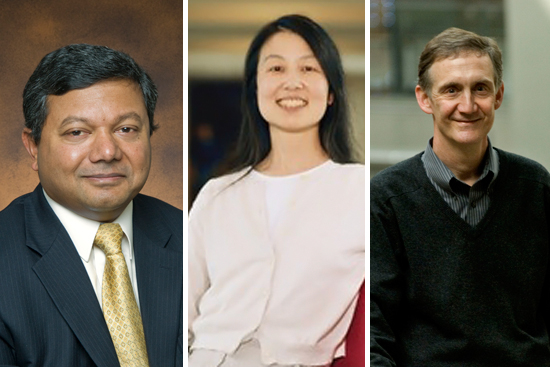Hariri Institute Holds Inaugural Symposium
Addressing importance of computational thinking

Scheduled speakers at the Hariri Institute’s first symposium are Arun Majumdar (from left), Jeannette Wing, and Ed Lazowksa; not pictured is Susan Athey.
The head of the U.S. government agency spurring innovative energy research, Microsoft’s chief economist, and academic computer scientists will headline the first symposium of the Rafik B. Hariri Institute for Computing and Computational Science & Engineering.
The symposium, being held Saturday, April 21, at the Photonics Center, will stress the importance of computational thinking and analysis in not just physical sciences, but the social sciences and even the arts, says Win Treese, the institute’s associate director. Free and open to the public, the symposium is the first in a series of still-to-be-determined events that will be held by the Hariri Institute.
“We would like the audience to get…a broad view of how computational thinking has come to be important in many different fields,” Treese says, as well as get “excitement about the potential of the Hariri Institute as a focal point and crossroads for computationally based research taking place at BU.”
BU President Robert A. Brown, whose office is cosponsoring the event, will give welcoming remarks, followed by the symposium speakers:
- Arun Majumdar directs the U.S. Department of Energy’s Advanced Research Projects Agency–Energy (ARPA-E). He has been nominated by President Obama as U.S. Under Secretary of Energy. He will discuss Information Technology Research: A National Priority.
- Susan Athey of Microsoft is also a Harvard economics professor. Her talk is titled Managing Online Marketplaces.
- Jeannette Wing is the chair of computer science at Carnegie Mellon University and the former head of the National Science Foundation Directorate for Computer and Information Science and Engineering. The directorate supports computer science and engineering research. Wing’s talk is on Computational Thinking.
- Ed Lazowska, a University of Washington computer science professor, is the founding director of that school’s eScience Institute. He is the chairman of the Computing Community Consortium, a group of computer faculty from around the country that identifies promising research in the field. He will talk about EScience: Computational Science for the 21st Century.
The Hariri Institute, begun with a $15 million pledge from BU trustee Bahaa Hariri (SMG’90), fosters the use of computation in collaborative, pioneering, interdisciplinary research and training.
“Computational thinking…helps us look at disciplines with fresh eyes” in two ways, says institute founding director Azer Bestavros, a College of Arts & Sciences professor of computer science. First, it allows researchers to better understand and control phenomena that may not at first blush seem to involve computation—for example, synthetic biology. Second, both physical and social sciences now collect and analyze data that “allow us to ask questions we could not answer,” he says, “and would not have thought to ask about before.”
The Hariri Institute Inaugural Symposium takes place Saturday, April 21, beginning at 9:30 a.m. at the Photonics Center, Room 206, 8 St. Mary’s St. Register here. Space is limited. Following the symposium, an open house will be held at the Hariri Institute, 111 Cummington St., Room 180.

Comments & Discussion
Boston University moderates comments to facilitate an informed, substantive, civil conversation. Abusive, profane, self-promotional, misleading, incoherent or off-topic comments will be rejected. Moderators are staffed during regular business hours (EST) and can only accept comments written in English. Statistics or facts must include a citation or a link to the citation.